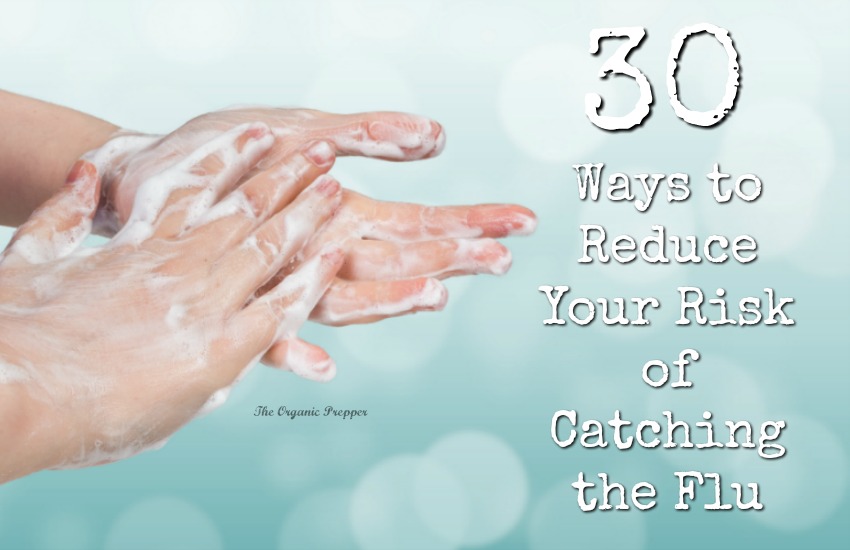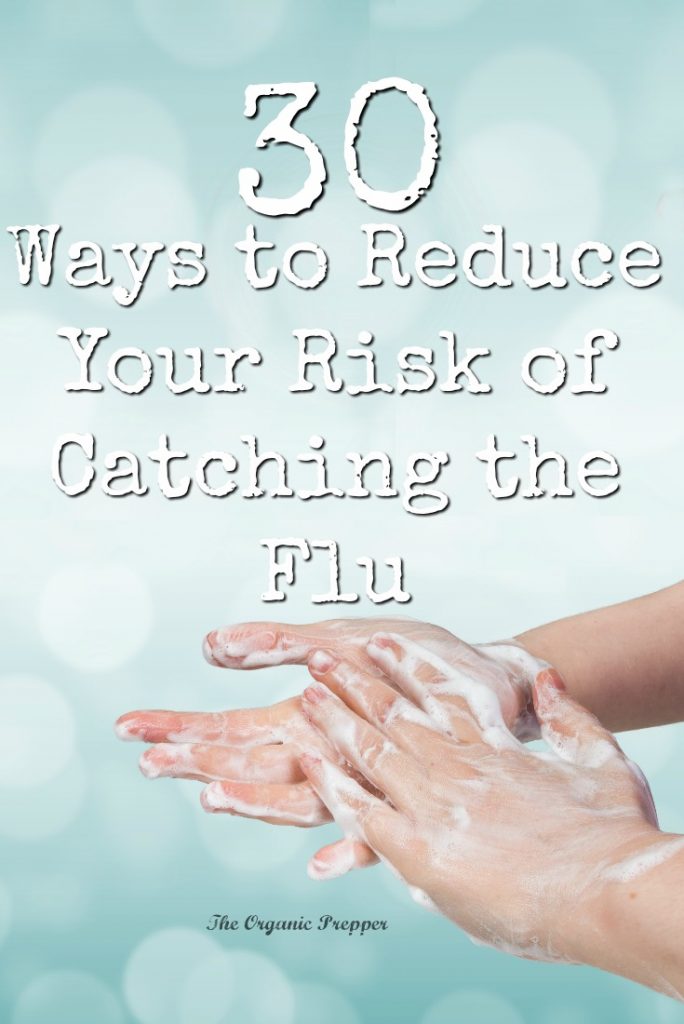If you're new here, you may want to subscribe to my RSS feed. Thanks for visiting!
By the author of Be Ready for Anything and the online course Bloom Where You’re Planted
2018 has started off with a bang… and not in a good way. So far, it’s shaping up to be the worst year of the flu in more than a decade. More than 100 people across the country have already died and we’re only 3 weeks into the new year. Hospitals are running out of IV bags. They’re setting up tents to treat people in the parking lot. Pharmacies are out of Tamiflu.
In short, this virus is bad news.
So how do you reduce your risk of catching the flu?
Here’s a hint:
Reducing your risk has absolutely nothing to do with being injected with a flu shot may only be 10% effective and could have mild to severe side effects. This is despite the fact that you’ll hear about 10,971 variations that “The best way to prevent catching the flu is to receive your annual flu shot.” Just because the media repeats it verbatim every single day doesn’t make it true.
Reducing your risk of catching the flu has everything to do with personal hygiene, leading a healthy lifestyle, and boosting your body’s immune system. Every year, I write about this topic, and every year, people respond by telling me that these ideas are fine for me but if you don’t “pick-an-excuse” then you just have to go and get the flu shot. I realize that all of these suggestions are not applicable to every family’s situation, but if one doesn’t work, there are still 29 more that may help.
None of these is foolproof. This year’s strain is particularly virulent and one new study suggests it can be transmitted by simply breathing. But every little bit helps and if your immune system is in good shape you have a much better chance of fighting the virus if you do get sick.
And a quick word about bleach and hand sanitizer: Our family doesn’t ordinarily use these products but during an outbreak, it’s go-hard-or-go-home time. Using these products for a couple of weeks during flu season will do more good than harm. The studies that say how bad these are for you are referring to people who use these items daily over long periods of time. Feel free to use natural products if you prefer but my recommendation is to use the strongest things available to you.
The absolute, number one way to avoid catching the flu is through the exercise of good personal hygiene.
- Wash your hands frequently when you are out.
- In public restrooms, use a paper towel to open bathroom doors and turn on taps.
- Although I’m normally not a big fan of hand sanitizer
, I always carry it with me in my purse during flu season. I use it generously when I’m out, before and after touching things that everyone else has been touching, like the handle of the shopping cart, door knobs, and debit machines.
- Use sanitizing wipes (or at least baby wipes) to wash your hands and wipe the steering wheel when you get back into your vehicle.
- Avoid touching your face – this welcomes germs that are on your hands into your body.
- During the height of flu season, consider taking a quick shower and changing clothes when you return home, particularly if you have been in a germ-ridden place like a doctor’s office or pharmacy. Or Wal-Mart – every time I go there, I see loads of sick people sneezing and coughing into their hands, then touching items on the shelves.
- Make sure the kids change clothes and thoroughly wash their hands when they return home from school.
- I shouldn’t really have to say this, but….remember to wash your hands after using the bathroom and before preparing or eating food.
If your local area is being hit hard by the flu, practice avoidance to keep your family healthy.
9. Stay home as much as possible. (Obviously, if you have work and school outside the home, this becomes more difficult, but you can still avoid malls, movie theaters, and sporting events for the duration of the epidemic.)
10. Stay away from sick people if you can.
11. Avoid eating at restaurants – you don’t know the health or hygiene habits of the kitchen staff.
If someone in your family gets sick, take steps to minimize the spread of the illness.
12. If you or a family member become sick, stay home from work or school to prevent passing it on to others.
13. If a family member is sick, keep them isolated from the rest of the family.
14. Use disinfecting wipes to clean surfaces that the sick person touches – doorknobs, TV remotes, keyboards, toilet handles, and phones. (One of my daughters got so offended when I followed her around with bleach wipes during an episode of strep throat years ago.)
15. Immediately place dishes and flatware used by the sick person into hot, soapy dishwater with a drop of bleach in it.
16. Teach children to cough into the crook of their arm instead of covering their mouth with their hands. This prevents their hands from being germ catchalls that transfer the contagious matter to everything they touch.
17. Have the sick person wash their hands frequently with soap and water to help prevent spreading germs through physical contact. If soap and water are unavailable, have them use hand sanitizer.
Some other ways to stay healthy are to use natural strategies to maximize your immune system.
18. Drink lots of water to keep your system hydrated and efficient.
19. Take a high quality, organic multi-vitamin. (I like this one)
20. Take at least 3000-5000 IUs of Vitamin D3 daily – research has shown a link between a Vitamin D deficit and susceptibility to the flu. (This one has 5000 IUs) As well, eat foods rich in Vitamin D such as eggs, dairy products, and fish.
21. Other important immune-boosting vitamins are Vitamin C and Zinc. Most vitamin C is genetically modified, so be especially careful to find a non-GMO vitamin C. These Zinc Lozenges
are good tasting and high quality. Enjoy foods rich in Vitamin C like citrus fruits and foods rich in Zinc like spinach, wheat, meat, and seeds.
21. Eat a diet high in fruits and vegetables (preferably organic and pesticide free).
22. Get 7-9 hours of sleep per day – a tired body has a weaker immunity against viruses.
23. Don’t smoke – this weakens your resistance against respiratory illnesses and worsens the effect on your body if you do become ill.
24. Avoid or limit alcoholic beverages.
25. Avoid or limit processed foods. Your body doesn’t recognize these as food and they do nothing to nourish you.
26. Get fresh air and sunshine as often as possible – your body absorbs Vitamin D from the sun’s rays.
27. Get at least 20 minutes of exercise a day. You don’t have to be training for a marathon – simply take the dog for a quick walk and you’ll improve your cardiac function, your circulation, and your respiratory function.
28. Choose personal care and cleaning products that don’t contain harmful chemicals. When you inhale the toxins into your lungs or absorb them through your skin, they can break down mucosal surfaces, making you more susceptible to germs and viruses. However, during flu season, I do tend to use harsher chemicals like bleach, particularly if someone in the household is ill.
29. Maintain a healthy body weight.
30. Try to reduce the stress in your life. When we are highly stressed, we’re far more likely to succumb to illness. This is because adrenaline and cortisol, in the long term, can drain your immune system, making it unable to fight off a cold or flu efficiently. Check out this natural product to help with stress and anxiety.
What if you still get sick?
The worst case scenario is that you do, indeed, contract the flu. Despite the hullabaloo, you are probably not going to die, be hospitalized, or suffer horrific permanent damage from a bout of the flu. People get sick, but death from the seasonal flu is still rare.
Check out the Flu Survival Guide for more tips if someone gets sick.
Resources:
- Cold or Flu? Here’s How to Tell (And Why You Need to Know)
- Fire Cider: How to Make a Fast, Effective Remedy for the Flu
- The Flu Survival Guide: Kitchen Remedies and Natural Strategies to Battle the Bug
- Alabama Declares State of Emergency for the Flu Epidemic as the US Death Toll Rises
- Sambucol Liquid Black Elderberry
- Organic Multi-Vitamins
- Nutrigold Vitamin D3 5000 IU
- Clarocet® NRI
- Viva Labs Premium Non-GMO Vitamin-C
- PURELL Sanitizing Hand Wipes
- Lysol Disinfecting Wipes
- Zinc Lozenges


















Use your own pen at the bank or credit union and use the cart handle wipes at the grocery store and remember that money is germy. Also wear a hat when its cold and windy to cover your ears ( if I don’t, I can wind up with a sore throat). If you do get the flu, stay home.
#1 should be do NOT get a flu shot.
All good suggestions. I will take the flu shot, even though it only provides about 10% protection for
this years flu strain H3N2. I’ll take that 10%. Beats 0 protection.
I’m not particularly into organic vs. non-organic, but I really like your vitamin recommendation. I’ll
be getting it, and probably taking one each day (since two will provide 200% of government
recommendation) I’ll have that base covered. Then take two when feeling something coming on.
Read once many years ago that certain individuals should not be taking more than the recommended
400 mcg of folic acid (many processed cereal grain based foods have it added already) so google
something like ..how much folic acid should I take?…and stick to good sites for reasoning behind
that concern and who it applied to (because the recommended 2 tablets above add up to 800 mcg).
It doesn’t have minerals but I like diary products so calcium is covered and I’ll either take a magnesium
supplement or up magnesium type foods.
Great article. And always interesting how the simplest tasks matter the most, like basic hygiene.
Do not let anyone’s dogs lick you. Not on your hands or face and if you pet them make sure you wash your hands before you touch anything…..especially your own family & pets.
Vitamin C is ascorbic acid. I don’t really see how it can be GMO or not GMO. By the time what you have is pure ascorbic acid it does not matter what kind of plant it came from, as far as I can see. Give me a reason to think otherwise.
It matters very much.
It’s made from genetically modified corn and processed with acetone – like nail polish remover. https://www.ora.organic/blogs/news/organic-vitamin-c-synthetic-vitamin-c